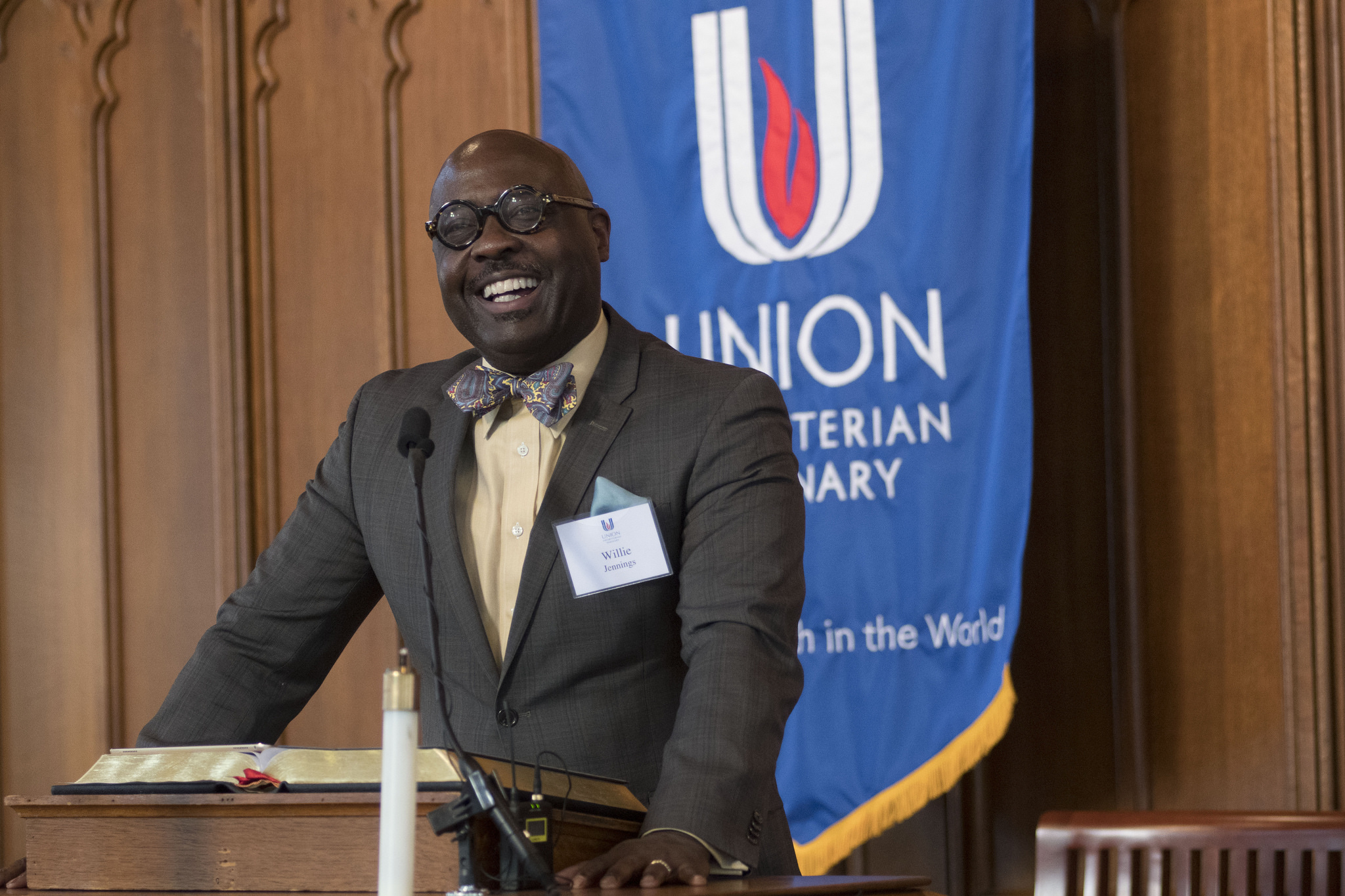Yale theology, Africana studies professor explores race, place and hope of the church at Sprunt lectures

RICHMOND, VA (May 18, 2018) – In four sweeping Sprunt Lectures delivered May 7 through May 9 at Union Presbyterian Seminary, the Rev. Dr. Willie Jennings explored the “lines” that divide humanity, the stubborn history of the barriers of race and place, and the hope that a reconsidered Christian theology of creation can overcome them.
“Our nation is now giving in to its deepest addiction…white supremacy, and that’s not new,” said Dr. Jennings. “It existed before the founding of the Republic.
“It is rooted in the queen of the theological maladies that plague us, and that is a distorted doctrine of creation.”
An associate professor of systematic theology and Africana studies at Yale University Divinity School, Dr. Jennings spoke about the ways that a “hermeneutics of possession” has resulted in a deadly fusion of place and race that has encased “isolated bodies” in false ethnic “prisons” and cut them off from the earth, the sky, plants, and animals, all of which are, or should be, understood as creation, redeemed by the Incarnation.
“Early Europeans asked, ‘who am I in this strange new place?’ It was the right question…the holy and good question.
‘But evil grew from its answer. Settlers did not include answers from those whom they found. They self-designated.”
The white newcomers, said Dr. Jennings, drew a circle around incredibly diverse peoples and dismissed their spiritual view of the world as “demonic” and childish. They declared these “others,” along with the rich flora and fauna of this new world simply as assets to be exploited, extracted, and monetized.
Land, he said, was understood not as a part of God’s creation that could speak to a people and give them a sense of belonging, of story, and of place. Those people categorized as nonwhite saw their property stolen, the landscape altered irreversibly, and “they began to think of themselves in disoriented ways. They were forced into racial encasement,” isolating their bodies from the land.”
“Christians forced them to do this and imagined it was the right thing to do.”
The consequences were profound and enduring. “The racial wound is a wound inside the geographic wound,” said Dr. Jennings, “concealed through visions of private property.”
Throughout history, he said, the power of “the line” has been fundamental to private property, racism, exclusion, and genocide. “There is an urgent need to rethink the line.”
Our patterns of belonging are diseased, said Jennings. “We have lost touch with the revolutionary intimacy inaugurated in the body of Jesus. At the body of Jesus is an intimacy so revolutionary, so path-breaking and life-forming that the Church is yet to catch up with where the Spirit is leading us.”
More than 200 alumni, students, faculty, and staff attended the annual lecture series, which began in 1911 through a generous gift by James Sprunt of Wilmington, NC, to bring speakers of outstanding quality to Union to discuss aspects of Christian thought and work.
As part of their classwork, students of professors Katie Geneva Cannon, John T. Carroll, and John W. Vest were assigned to submit reflections of Jennings’ lectures.
M.Div./M.A.C.E. student Linda Fox stated in an excerpt from her reflection that the colonialists refashioned the God of land and animal to be the God of possession and privatization. “Dr. Jennings helped me understand that the early settlers did at least ask why they had been placed in this new world,” she said. “Racism began as they chose to answer by self-designating into racial categories and making themselves the standard and pinnacle of what should be.”
In his reflection, M.Div. student Martin Pinckney recalled Jennings saying that ‘Joining is everything. We Christians are struggling to catch up to a God-made-flesh.’ “In his commentary on Acts 15, Jennings writes ‘How can peoples be joined together, truly joined together without loss, without the death of one (people’s ways) for the sake of the other? Segregation has been history’s, and Christianity’s, default way of dealing with difference.’”
“The question we need to ask isn’t where should we be in the world, but how should we be in the places where we live,” M.Div. student Scott Honaker recalled Jennings saying. “By carrying on each other’s stories, we ‘remember together’ and ‘move toward the future in different ways.’ The point, he says, is the joining.”
“Like ‘the geographic wound,’ ‘the racial wound’ is a natural development from a mistaken creation doctrine,” M.Div. student Jay Morgan wrote in his reflection. “When humans began thinking of land primarily as private property, it led to divisions between households, peoples, and areas. Areas eventually became nations, and their peoples began to see the land through the twisted lens of nationalism.”
Watch videos of Jennings’ lectures, and worships with the Rev. Dr. Jill Duffield (M.Div.’96).
See photos of the event, including a ceremony honoring 2018 Distinguished Alumnus the Rev. One Ho Park (Ed.D’89), president of the Graduate School of Practical Theology in Seoul, Korea; a ceremony honoring 2018 Black Alumni Association Trailblazer the Rev. Karen Brown (M.Div.’92), pastoral associate at Grace Presbyterian Church in Baltimore, Maryland, and resource developer for Intersection of Change; a cookout and concert on the quad with musical group Wkdr; and a special worship and service day at the new Shalom Farms on our Westwood Tract.
See photos of our Third Annual Union Golf Tournament at Jefferson Lakeside Country Club in Richmond.

